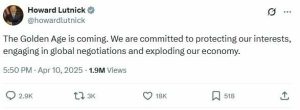After US President Donald Trump’s tariff barrage caused chaos on global markets, China’s President Xi Jinping called on the European Union to stand with Beijing in opposing ‘unilateral bullying’ on Friday
Trump blinked first this week in his attempt to restructure the post-war system of international trade and froze many tariffs for ninety days as stocks crashed and bond markets began to flash red.
However, he increased them for China to an astounding 145%, intensifying the trade war between the two largest economies in the world and putting an end to a brief financial market rise.
Trump dismissed global market turbulence while acknowledging “a transition cost and transition problems” as the dollar declined as well.
“It will be a beautiful thing in the end.”
He called the European Union’s decision to forgo retaliatory taxes “very smart.” However, the bloc’s leader cautioned that a “wide range of countermeasures” are still available.
The European Union was prepared to declare retribution. After that, they learned about our actions toward China,” Trump stated.
He stated on X that “we must demonstrate our strength with the European Commission: Europe must continue to work on all the necessary counter-measures.”
According to official media, Xi stated that China and the EU should just work together on the matter during discussions with Pedro Sanchez, the prime minister of Spain, today.
“Europe and China should fulfill their international obligations… and work together to oppose unilateral bullying practices,” Xi stated.
Not only would this “protect their own legitimate rights and interests, but also… safeguard international fairness and justice,” he emphasized.
‘No winners.’
Asian markets were once again under pressure on Friday following fresh declines on Wall Street.
A day after rising more than 9%, Tokyo fell more than 4%, and other cities like Sydney, Seoul, and Singapore all saw declines.
Fears of a global recession caused oil and the currency to plummet, while investors alarmed by Trump’s unpredictable intentions dumped typically reliable US Treasuries, sending gold to a new high above $3,200.
“The sugar high from Trump’s tariff pause is quickly wearing off,” SPI Asset Management’s Stephen Innes stated.
“The bottom line is that there are no winners in the full-fledged trade war between the two biggest economies in the world.”
‘Golden Age’
According to Trump, he intends to restructure the global economy by requiring companies to establish their operations in the US and lowering international trade restrictions on US goods.
Trump’s tactics, according to critics, are driving businesses that depend on intricate supply chains into disarray, driving away loyal partners, and raising the cost of goods for American consumers.
His commerce secretary, Howard Lutnick, wrote on social media Thursday that “the Golden Age is coming.” We are dedicated to defending our rights, participating in international discussions, and growing our economy.
 The EU issued its own olive branch by halting duties on 20 billion euros ($22.4 billion) worth of US imports for 90 days, while also applauding the US president’s partial retraction.
The EU issued its own olive branch by halting duties on 20 billion euros ($22.4 billion) worth of US imports for 90 days, while also applauding the US president’s partial retraction.
Ursula von der Leyen, the head of the 27-nation bloc, told the Financial Times that the group still has a “wide range of countermeasures” at its disposal in case talks with Trump go awry.
Across the bloc, she stated, “An example is you could put a levy on the advertising revenues of digital services.”
Trump also sent a warning that the tariffs might return after the allotted 90 days. “We would return to our previous position if we are unable to reach the agreement we desire,” he stated.
Prime Minister Mark Carney of Canada referred to Trump’s reversal as a “welcome reprieve” and stated that following the April 28 elections, Ottawa would start talks with Washington on a new trade agreement.
Pakistan is sending a delegation to Washington, and Vietnam announced that it and the US have agreed to begin trade negotiations.
The tariff drama is anticipated to be a major topic of discussion during Xi’s trip to Vietnam, Malaysia, and Cambodia next week as China looks for allies to oppose Trump’s trade war.
For the latest updates and insights on new developments, visit the NEWSON
Q1: Why did China raise tariffs to 145% on US goods?
China raised tariffs in response to US President Donald Trump’s aggressive trade measures, aiming to counteract what President Xi Jinping called “unilateral bullying” and protect national interests amid escalating trade tensions.
Q2: What is the EU’s stance on the US-China trade war?
The EU has called for cooperation with China to oppose unilateral actions. While it welcomed Trump’s temporary pause on some tariffs, the EU warned it has a “wide range of countermeasures” ready if trade talks fail.
Q3: How has the global market reacted to the trade conflict?
Markets have been highly volatile. Global stocks tumbled, gold surged above $3,200, and recession fears rose. Asian markets, in particular, saw sharp declines following Trump’s tariff escalation on China.
Q4: What are Trump’s goals in this trade war?
Trump aims to restructure international trade, bring manufacturing back to the US, and reduce trade barriers for American goods. However, critics say his approach is causing global instability and harming supply chains.
Q5: What role is China playing in the trade discussions?
China is seeking global alliances, particularly with the EU and Southeast Asian countries, to push back against US pressure. President Xi emphasized international cooperation and fairness during his meeting with Spain’s PM.
Q6: Could the US reinstate tariffs after the 90-day pause?
Yes, Trump stated that tariffs could return if no favorable deal is reached within 90 days, keeping markets and international partners on edge.


